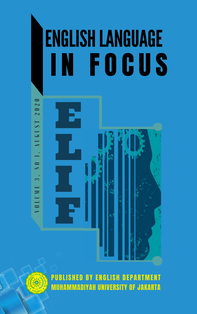Explicit Vocabulary Instruction with English Language Learners: a Charade Game
DOI:
https://doi.org/10.24853/elif.3.1.39-48Keywords:
Charade, Game, VocabularyAbstract
The present study aimed to determine the efficacy of students' vocabulary mastery by Charade Game. This research has used 8th students of SMPN 18 KOTA TANGERANG SELATAN as a sample population. There had been 30 students throughout this group. The researchers used a simple cluster sampling technique to select the sample. The method of this study was quantitative and a quasi-experimental design of the pre-test and post-test. The data used for this study were gathered through pre-test and post-test vocabulary. Pre-test and post-test data then were analyzed numerically via SPSS19. The findings of this research clarified that the student pre-test score was 57 but then after treatment, the student post-test score was 81.83. The findings also indicate that the tobtained value was 15.79 and the tcritical value was 0.05. These findings mean that Charade Game was likely to succeed in mastering vocabulary.References
Alqahtani, M. (2015). The importance of vocabulary in language learning and how to be taught. International Journal of Teaching and Education, 3(3), 21–34.
Ashraf, H., Motlagh, G., & Salami, M. (2014). The Impact of Online Games on Learning English Vocabulary by Iranian (Low-intermediate) EFL Learners. Procedia-Social and Behavioral Sciences, 98, 286–291. https://doi.org/10.1016/j.sbspro.2014.03.418
Bafadal, M. F., & Humaira. (2019). The Use of Charades Games in Teaching Vocabulary to the Junior High School Students. Linguistics and Elt Journal, 5(1), 21. https://doi.org/10.31764/leltj.v12i2.748
Bakhsh, S. A. (2016). Using Games as a Tool in Teaching Vocabulary to Young Learners. English Language Teaching;, 9(7), 120–128. https://doi.org/10.5539/elt.v9n7p120
Banerjee, S. (2014). Learn and Unlearn: Drama as an Effective Tool in Teaching English Language and Communication. International Journal of English Language & Translation Studies, 2(1), 79–91. http://www.eltsjournal.org/
Byram, M., & Wagner, M. (2018). Making a Difference: Language Teaching for Intercultural and International Dialogue. Foreign Language Annals, 51(1), 140–151. https://doi.org/10.1111/flan.12319
Chen, C. M., & Chung, C. J. (2008). Personalized Mobile English Vocabulary Learning System Based on Item Response Theory and Learning Memory Cycle. Computers and Education, 51(2), 624–645. https://doi.org/10.1016/j.compedu.2007.06.011
Derakhshan, A., & Khatir, E. D. (2015). The Effects of Using Games on English Vocabulary Learning. Journal of Applied Linguistics and Language Research, 2(3), 39–47. http://www.jallr.com/index.php/JALLR/article/view/40
Ellery, V. (2009). Creating Strategic Readers: Techniques for Developing Competency in Phonemic Awareness, Phonics, Fluency, Vocabulary, and Comprehension. International Reading Association.
Fan, M. (2000). How Big Is the Gap and How To Narrow It? an Investigation Into the Active and Passive Vocabulary Knowledge of L2 Learners. RELC Journal, 31(2), 105–119. https://doi.org/10.1177/003368820003100205
Fenton, B. S., & McNeill, L. (2018). How many words do you need to speak a language? BBC News. https://www.bbc.com/news/world-44569277
Gay, L., Mills, G. E., & Airasian, P. (2019). Educational Research : Competencies for Analysis and Applications (12th ed.). Pearson Education, Inc.
Glouberman, M., & Heti, S. (2011). The Chairs Are Where the People Go: How to Live, Work, and Play in the City. D&M Publisher, Inc.
Hadi, M. S. (2015). Games as The Strategy in Teaching Speaking for young Learners. The 1st International Seminar of Early Childhood Care and Education, 107–121. https://www.researchgate.net/publication/324417562_Games_as_The_Strategy_in_Teaching_Speaking_for_young_Learners
Halimah, F., & Izzah, L. (2020). Building FL-Vocabulary Transferability through Semantic Boggle. English Language in Focus (ELIF), 2(2), 79–86. https://doi.org/https://doi.org/10.24853/elif.2.2.79-86
Halimah, N., & Basri, M. (2017). Fun Vocabulary Learning in EFL Classroom Through Charades Game: Why Not? The 4th UAD TEFL International Conference, UAD Yogyakarta 2017, 1(0), 397–401. http://seminar.uad.ac.id/index.php/utic/article/view/192
Kusmaryati, S. E. (2018). A Model of Communicative Teaching and Learning of English Vocabulary Through Interactive Activities. Prominent, 1(1). https://doi.org/10.24176/pro.v1i1.2488
Kusrini, E. (2012). Teaching Vocabulary for Junior High School Students Using Snake and Ladder Game. AKTIF, 19(4), 1–9. http://jurnalnasional.ump.ac.id/index.php/aktif/article/view/186
Nisbet, D. L., & Tindall, E. R. (2015). A framework for explicit vocabulary instruction with English language learners. Kappa Delta Pi Record, 51(2), 75–80. https://doi.org/10.1080/00228958.2015.1023141
Pourdana, N., Sahebalzamani, S., & Rajeski, J. S. (2014). Metaphorical awareness: A new horizon in vocabulary retention by Asian EFL learners. International Journal of Applied Linguistics and English Literature, 3(4), 213–220. https://doi.org/10.7575/aiac.ijalel.v.3n.4p.213
Saputra, H. N., & Hadi, M. S. (2019). Teaching Vocabulary Through Fly Swatter Game. English Language in Focus (ELIF), 2(1), 17–24. https://doi.org/10.24853/elif.2.1.17-24
Sutedi, A. (2009). Metode Penelitian Hukum. Sinar Grafika.
Yolanda, D., & Hadi, M. S. (2019). Using Puppet Games in Teaching Speaking for Tenth Graders of Senior High School. English Language in Focus (ELIF), 2(1), 1–8. https://doi.org/10.24853/elif.2.1.1-8
Downloads
Published
Issue
Section
License
Authors who publish with this journal agree to the following terms:
- Authors retain copyright and grant the journal right of first publication with the work simultaneously licensed under a Creative Commons Attribution License that allows others to share the work with an acknowledgment of the work's authorship and initial publication in this journal.
- Authors can enter into separate, additional contractual arrangements for the non-exclusive distribution of the journal's published version of the work (e.g., post it to an institutional repository or publish it in a book), with an acknowledgment of its initial publication in this journal.
- Authors are permitted and encouraged to post their work online (e.g., in institutional repositories or on their website) before and during the submission process, as it can lead to productive exchanges, as well as earlier and greater citation of published work (See The Effect of Open Access).


